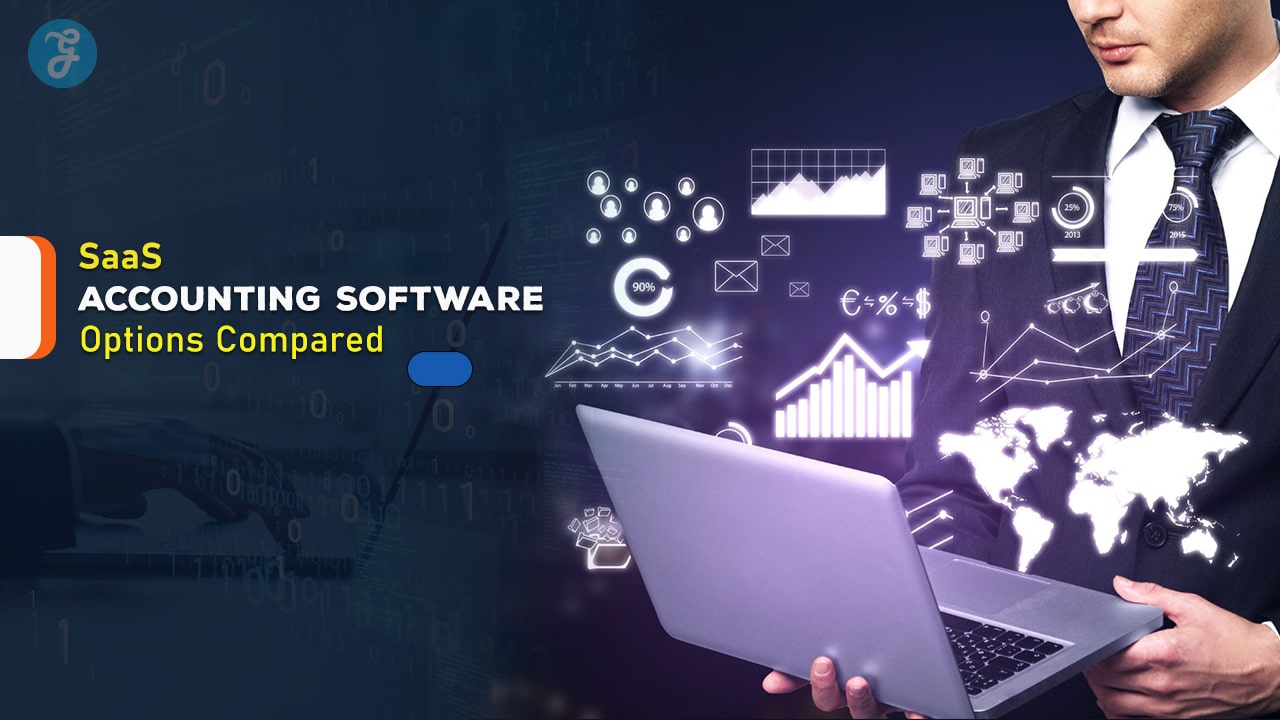The rise of Software as a Service (SaaS) solutions has revolutionized the accounting industry, providing businesses with flexible, cloud-based platforms to manage their finances efficiently.
SaaS accounting software offers a range of features, from basic bookkeeping to advanced financial reporting and tax preparation, accessible from anywhere and anytime.
Choosing the right software is critical to streamline financial processes, reduce errors, and ensure compliance with financial regulations.
In this comprehensive guide, we will explore and compare 10 SaaS accounting software options, evaluating their features, pricing, pros, cons, and suitability for different business sizes and industries.
Whether you’re a small business owner, a freelancer, or managing a large enterprise, this detailed comparison will help you choose the best accounting software for your needs.
1. QuickBooks Online
QuickBooks Online is one of the most popular SaaS accounting solutions, particularly for small to medium-sized businesses.
QuickBooks Online, created by Intuit, offers a wide range of features that cover everything from bookkeeping to sophisticated reporting and tax preparation.
It’s well-known for its user-friendly interface, powerful integrations, and scalability.
Key Features
- Invoicing and Billing: Create customized invoices and track payments.
- Expense Tracking: Automatically categorize expenses and sync with bank accounts.
- Tax Preparation: Built-in tax tools, including sales tax tracking and year-end tax preparation.
- Inventory Management: Track inventory levels and costs (available in higher-tier plans).
- Advanced Reporting: Generate financial reports like profit & loss, balance sheets, and cash flow statements.
- Third-Party Integrations: Integrates with over 650 business apps, including PayPal, Square, Shopify, and more.
Pricing
- Simple Start: $30/month
- Essentials: $55/month
- Plus: $85/month
- Advanced: $200/month
Pros
- Easy to use with a minimal learning curve.
- Extensive integrations with third-party apps.
- Robust mobile app for managing finances on the go.
- Scalable, making it suitable for small businesses to mid-sized companies.
Cons
- Can become expensive with add-ons and advanced features.
- Customer support response times can vary.
- Advanced reporting and features are limited to higher-tier plans.
Best For
Small to mid-sized businesses, freelancers, and startups looking for a comprehensive, easy-to-use accounting platform with scalability.
2. Xero
Xero is a cloud-based accounting software solution that has gained popularity for its clean, intuitive interface and powerful features geared toward small to medium-sized businesses.
With over 2 million users globally, Xero emphasizes collaboration, allowing multiple users (such as business owners and accountants) to access financial data in real-time.
Key Features
- Automated Bank Feeds: Automatically imports and reconciles bank transactions.
- Invoicing: Create professional invoices and send automatic payment reminders.
- Expense Management: Track employee expenses and integrate with receipt capture apps.
- Project Tracking: Track profitability by project (higher-tier plans).
- Multi-Currency Support: Manage foreign currency transactions.
- Customizable Reports: Detailed reports on cash flow, income, and more.
Pricing
- Starter: $13/month
- Standard: $37/month
- Premium: $70/month
Pros
- Unlimited user access on all plans, ideal for growing businesses.
- Excellent mobile app for on-the-go accounting.
- Great support for collaboration between accountants and business owners.
- Clean and modern user interface.
Cons
- Limited customer support hours, especially in non-English-speaking regions.
- Certain advanced features (like project tracking) are only available in higher plans.
- Lacks a dedicated payroll feature in some countries (such as the U.S.).
Best For
Growing businesses, freelancers, and startups that require multiple users and prefer an easy-to-navigate interface with collaborative features.
3. FreshBooks
FreshBooks is designed primarily for freelancers, self-employed professionals, and small businesses.
Known for its excellent invoicing features and ease of use, FreshBooks offers a range of tools that make managing finances and time tracking simple.
Key Features
- Invoicing: Customizable invoices with automatic payment reminders and late fees.
- Expense Tracking: Capture receipts, categorize expenses, and import bank transactions.
- Time Tracking: Built-in time tracking for billable hours.
- Project Management: Collaborate with clients and team members on projects.
- Double-Entry Accounting: Generate financial statements such as profit and loss, balance sheet, and general ledger.
- Payment Processing: Accept payments online via credit card or ACH.
Pricing
- Lite: $15/month (up to 5 billable clients)
- Plus: $25/month (up to 50 billable clients)
- Premium: $50/month (unlimited billable clients)
- Select: Custom pricing for businesses with advanced needs
Pros
- Excellent invoicing capabilities with built-in time tracking.
- Very easy to use, making it ideal for freelancers or service-based businesses.
- Integration with popular payment processors like Stripe and PayPal.
- Strong customer support with good availability.
Cons
- Pricing increases significantly as you add more billable clients.
- Limited reporting and accounting tools compared to competitors like QuickBooks and Xero.
- Lacks advanced inventory management features.
Best For
Freelancers, self-employed professionals, and small service-based businesses that need robust invoicing, time tracking, and project management features.
4. Wave Accounting
Wave is a free, cloud-based accounting platform targeted primarily at small businesses, freelancers, and solo entrepreneurs.
Despite being free, Wave offers a surprising number of features, including invoicing, expense tracking, and reporting, making it an excellent choice for those looking to manage their finances without breaking the bank.
Key Features
- Free Accounting: Completely free accounting software with no monthly fees.
- Invoicing: Create, send, and track invoices with automatic reminders.
- Bank Reconciliation: Connect your bank accounts and categorize transactions.
- Financial Reports: Access profit and loss statements, balance sheets, and cash flow reports.
- Receipt Scanning: Mobile app allows for receipt capture and categorization.
- Payroll (Paid Add-On): Full-service payroll available in some countries (e.g., U.S. and Canada).
Pricing
- Accounting and Invoicing: Free
- Payment Processing: 2.9% + 30¢ per transaction (credit card); 1% per transaction (ACH)
- Payroll: $20-$35/month + $6 per employee
Pros
- Completely free for accounting and invoicing, making it highly attractive to startups and freelancers.
- Simple and intuitive interface.
- Decent set of features for a free product, including financial reporting.
- Optional add-ons for payment processing and payroll make it more flexible.
Cons
- Limited scalability for larger businesses or those with complex needs.
- Fewer integrations compared to other SaaS solutions like QuickBooks and Xero.
- Payroll feature is only available in the U.S. and Canada.
Best For
Freelancers, small businesses, and startups on a tight budget who need basic accounting and invoicing without the need for advanced features or high monthly costs.
5. Zoho Books
Zoho Books is part of the Zoho suite of business applications and is designed for small to medium-sized businesses looking for a comprehensive accounting solution.
With deep integration into the broader Zoho ecosystem (including CRM, inventory, and HR tools), Zoho Books is a robust option for businesses already using or considering Zoho products.
Key Features
- Invoicing: Create and send custom invoices with recurring billing options.
- Expense Tracking: Track expenses and automatically categorize transactions.
- Inventory Management: Monitor stock levels, set reorder points, and generate inventory reports.
- Project Management: Track project costs, billable hours, and profits.
- Multi-Currency: Handle international transactions with ease.
- Automated Workflows: Automate repetitive tasks like sending invoices or setting payment reminders.
Pricing
- Free: $0/month (up to 3 users)
- Standard: $15/month (up to 3 users)
- Professional: $40/month (up to 5 users)
- Premium: $60/month (up to 10 users)
Pros
- Deep integration with other Zoho products makes it an excellent choice for businesses using the Zoho ecosystem.
- Affordable pricing with a feature-rich free plan.
- Supports multiple currencies and offers excellent customization options.
- Automated workflows simplify routine tasks.
Cons
- The interface can be overwhelming for users unfamiliar with Zoho’s ecosystem.
- Limited integration options with non-Zoho software.
- Support for third-party apps is not as extensive as other competitors.
Best For
Small to medium-sized businesses that use or plan to use Zoho’s ecosystem and need a feature-rich accounting solution with multi-currency support, automated workflows, and inventory management.
6. Kashoo
Kashoo is a simplified accounting solution designed for freelancers, small businesses, and non-accountants who need an easy-to-use, cloud-based platform.
While not as feature-rich as some competitors, Kashoo focuses on providing a straightforward, affordable tool for managing invoices, expenses, and financial reports.
Key Features
- Simple Invoicing: Create and send professional invoices with built-in payment tracking.
- Expense Management: Automatically categorize transactions and sync with bank accounts.
- Automatic Reconciliation:Match bank transactions to records for easy reconciliation.
- Multi-Currency: Manage and track multi-currency transactions.
- Real-Time Reporting: Access financial reports, including income statements, balance sheets, and cash flow reports.
Pricing
- Kashoo Plan: $20/month
- Kashoo Pro: Custom pricing for advanced features
Pros
- Easy to use and designed with non-accountants in mind.
- Real-time data sync ensures your financial information is always up to date.
- Straightforward, no-frills approach to invoicing and expense tracking.
- Low cost compared to more feature-rich software like QuickBooks or Xero.
Cons
- Lacks advanced features like inventory management, project tracking, or deep integrations with other apps.
- Limited reporting capabilities compared to more robust platforms.
- Not ideal for larger businesses with complex accounting needs.
Best For
Freelancers, sole proprietors, and small business owners who need a basic accounting platform with straightforward invoicing and expense tracking features.
7. Sage Business Cloud Accounting
Sage Business Cloud Accounting (formerly Sage One) is a cloud-based accounting solution that caters to small and growing businesses.
Sage has a long-standing reputation in accounting software, and its cloud version brings flexibility and ease of access to businesses that need financial management tools on the go.
Key Features
- Invoicing and Quotes: Create and send invoices and quotes with real-time tracking.
- Cash Flow Management: Monitor and forecast cash flow to stay on top of financial health.
- Expense Tracking: Automatically record expenses and bank transactions.
- Inventory Tracking: Manage stock levels, including reordering points and sales trends.
- Multi-Currency: Handle foreign transactions with currency conversion and exchange rates.
- Financial Reporting: Access detailed financial statements, cash flow reports, and tax summaries.
Pricing
- Accounting Start: $10/month
- Accounting: $25/month
Pros
- Affordable pricing, particularly for small businesses.
- Easy-to-use interface that simplifies cash flow management and financial reporting.
- Deep accounting features for more advanced users, including cash flow forecasting.
- Offers strong mobile capabilities for managing accounts on the go.
Cons
- Limited customization options for reports compared to QuickBooks or Xero.
- Integrations with third-party apps are not as extensive as competitors.
- Customer support can be slow during peak times.
Best For
Small businesses and startups looking for affordable, user-friendly accounting software that supports core financial processes and inventory management without complex features.
8. NetSuite ERP
NetSuite ERP is a comprehensive cloud-based Enterprise Resource Planning (ERP) solution, ideal for larger businesses that require extensive accounting, financial management, and operational tools.
While it offers more than just accounting features, NetSuite’s financial modules are highly regarded for their depth and functionality.
Key Features
- General Ledger: A robust general ledger with multi-book capabilities.
- Accounts Payable and Receivable: Automates payment processing, invoicing, and cash management.
- Advanced Financial Reporting: In-depth financial reports that support multiple entities, tax reporting, and audit trails.
- Multi-Currency and Global Compliance: Supports complex tax codes, multi-currency transactions, and international accounting standards.
- Inventory and Order Management: Full suite of inventory and order management tools for manufacturing and retail businesses.
- CRM and eCommerce Integration: Direct integration with NetSuite CRM and eCommerce solutions for a unified business platform.
Pricing
NetSuite pricing is custom and based on the specific needs of the business, with estimates starting around $999/month for small businesses, plus implementation fees.
Pros
- A comprehensive solution that covers all aspects of business operations, not just accounting.
- Supports complex financial management for large enterprises or businesses with multiple subsidiaries.
- Fully customizable to meet the specific needs of different industries.
- Scalable as the business grows, handling everything from startup operations to multi-national corporations.
Cons
- High cost, making it more suited to larger businesses or enterprises.
- Longer implementation process, often requiring expert assistance.
- The steep learning curve for businesses not familiar with ERP systems.
Best For
Large enterprises, multi-location businesses, and growing mid-sized companies that require a robust ERP solution to manage their entire business, including advanced accounting features, inventory, and CRM.
9. KashFlow
KashFlow is a UK-based accounting software designed for small businesses.
Its cloud-based platform focuses on simplifying financial management, particularly for businesses that need UK tax compliance and VAT reporting features.
Key Features
- Invoicing: Customizable invoices with recurring billing options.
- Expense Management: Automatically capture and categorize expenses.
- Bank Reconciliation: Automatically import and reconcile bank transactions.
- Payroll: Includes integrated payroll for managing employee salaries and tax withholdings.
- VAT Returns: Fully compliant with Making Tax Digital (MTD) for VAT submission in the UK.
- Project Management: Track profitability for individual projects and manage client payments.
Pricing
- Starter: £8/month
- Business: £16/month
- Business + Payroll: £22/month
Pros
- UK-specific features such as VAT reporting and MTD compliance are built-in, making it ideal for UK businesses.
- Simple interface designed for small business owners with no accounting experience.
- Integrated payroll adds value for businesses that need to manage employee payments and taxes.
Cons
- Limited to UK-based businesses or businesses that need UK tax support.
- Fewer integrations compared to major global competitors like QuickBooks or Xero.
- Lacks some advanced accounting features needed by larger businesses.
Best For
UK-based small businesses and freelancers that need an affordable and easy-to-use accounting software solution with VAT and payroll features included.
10. FreeAgent
FreeAgent is another UK-based accounting software designed for freelancers, small businesses, and contractors.
Its focus is on providing an intuitive platform that simplifies tax compliance, invoicing, and time tracking for solo entrepreneurs or small teams.
Key Features
- Invoicing: Easily create and send invoices, track payments, and send reminders for overdue invoices.
- Tax Automation: Automatically calculates tax liabilities, including VAT, corporation tax, and self-assessment.
- Time Tracking: Built-in time tracking for billable hours, ideal for freelancers and contractors.
- Expense Management: Track and categorize expenses with receipt scanning.
- Bank Integration: Sync your bank account to import transactions and reconcile statements.
- Project Profitability: Manage projects by tracking costs and profitability.
Pricing
- Universal Plan: £14.50/month for the first 6 months, then £29/month.
Pros
- Simplifies tax compliance, making it easier for freelancers and small businesses to manage self-assessments and VAT returns.
- Time tracking and project management features are perfect for service-based businesses.
- Intuitive, user-friendly design with a minimal learning curve.
- Integrates with HMRC for direct tax filing.
Cons
- Limited scalability for businesses that grow beyond a small team or need more complex features.
- UK-focused, so businesses outside the UK might not benefit from the tax and payroll features.
- Not as feature-rich as more robust options like Xero or QuickBooks.
Best For
UK-based freelancers, small businesses, and contractors who need easy-to-use software with invoicing, expense management, and tax compliance features.
Conclusion
Choosing the right SaaS accounting software depends on your business size, industry, and specific needs.
Whether you’re a freelancer looking for a simple invoicing tool or a large enterprise needing advanced financial management, there’s an option that fits your requirements.
From QuickBooks Online and Xero, which offer extensive features and integrations, to Wave and FreeAgent, which provide affordable and user-friendly solutions for smaller businesses, each software has its strengths.
Consider factors like ease of use, pricing, scalability, and the specific features you need—such as payroll, inventory management, or multi-currency support—before making a decision.
This guide should help you narrow down the best options for managing your business’s financial health efficiently and securely.




































